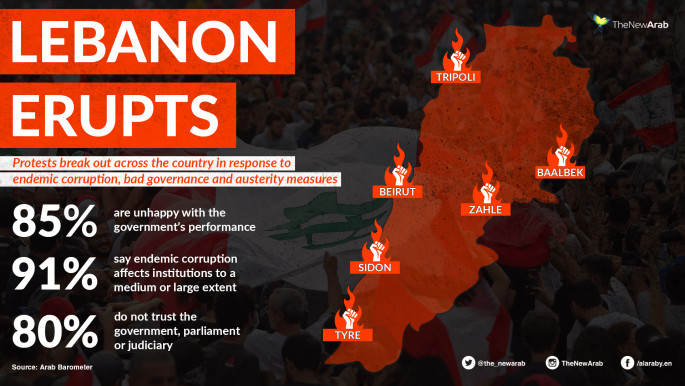Follow us on Twitter and Instagram to stay connected
Lebanese protesters pour onto streets again to reject putative new 'consensus prime minister'
About two hundred demonstrators marched on the "Ring Bridge" to protest against Lebanon's outgoing Prime Minister Saad Hariri's decision to back businessman Samir Khatib to replace him.
Riot police prevented protesters from blocking the highway, while dozens of the protesters sat down on the ground and chanted anti-government slogans.
Hariri said on Tuesday he supports the nomination of the prominent contractor to become the country's next premier, a move that will likely pave the way for the formation of a new cabinet amid a severe economic and financial hardships for the country.
Last week, Hariri withdrew his candidacy for the premiership, saying he hoped to clear the way for a solution to the political impasse amid nearly eight weeks of anti-government protests.
Speaking to reporters Tuesday night, Hariri said he backs Samir Khatib to become the country's next prime minister, adding he hoped to it would lead to something good.
"I support the candidacy of engineer Samir Khatib for the premiership. But there are still some details to finalise. Inshallah, hope for the best," he told reporters.
Khatib heads one of Lebanon's largest engineering and contracting companies and has not held any political roles in the past.
Over the past weeks, politicians failed to agree on how to form a new government.
Hariri had insisted on heading a government of technocrats, while his opponents, including the Iran-backed organisation Hezbollah, want a cabinet made up of both industry experts and politicians.
It was not clear how the protesters, who have been demonstrating against widespread corruption and mismanagement in the country, will eventually respond to the possible formation of the government.
The frustrated protesters have resorted to road closures and other tactics to pressure politicians into responding to their demands for a new government.
They have insisted that a new cabinet be made up of independent figures that have nothing to do with the ruling elite that have been running the country since the 1975-90 civil war ended.
Lebanon's current political leaders are accused of corruption and patronage and are blamed for a decline in public services and living standards in the country.
President Michel Aoun is now expected to call for binding consultations with heads of parliamentary blocs to name the new prime minister.
But since Hariri, the most powerful Sunni leader in the country said he will back Khatib, the contractor is widely expected to get the post.
According to Lebanon's power sharing system implemented since independence from France in 1943, the president has to be a Maronite Christian, the prime minister should be a Sunni and the parliament speaker a Shia.
Cabinet and parliament seats are equally split between Christians and Muslims.





 Follow the Middle East's top stories in English at The New Arab on Google News
Follow the Middle East's top stories in English at The New Arab on Google News
![Israeli forces ordered bombed Gaza's Jabalia, ordering residents to leave [Getty]](/sites/default/files/styles/image_330x185/public/2176418030.jpeg?h=a5f2f23a&itok=_YGZaP1z)

